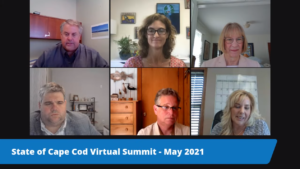
Matt Pitta, Alissa Magnotta, Wendy Northcross, Ryan Castle, Andrew Gottlieb, and Kara Galvin during the State of the Cape Virtual Summit.
HYANNIS – Regional community leaders met Wednesday during the State of the Cape Virtual Summit to discuss some of the biggest challenges facing Cape Cod & the Islands.
Recovery from the COVID-19 pandemic was the focus of the summit, an issue that has exacerbated other obstacles the Cape faces such as affordable housing, unemployment, and a steadily growing labor shortage.
The summit was moderated by Director of Communications at The Davenport Companies Matt Pitta and featured insights from Association to Preserve Cape Cod Executive Director Andrew Gottlieb, Cape Cod Chamber of Commerce CEO Wendy Northcross, and Cape & Islands Association of Realtors CEO Ryan Castle.
MassHire Cape & Islands Workforce Board Executive Director Kara Galvin and Housing Assistance Corporation CEO Alisa Magnotta also provided their expertise during the summit.
Northcross said that the Cape is facing a “perfect storm” of business struggles, as costs of goods rise while sources of labor dry up, particularly due to a drought of foreign student workers caused by closed embassies.
She also said that pent up demand in consumers may bring one of the busiest summers to Cape Cod ever, making the labor shortage all the more pressing.
Already, she said, web traffic has indicated that the region can expect an explosion of travelers
“Businesses need to make up lost ground, and yet they’re faced with a lot of challenges,” said Northcross.
Galvin said that the hunt for workers has been impacted heavily by competitive unemployment benefits as well as a difficulty finding childcare options.
Affordable housing options have also plagued the Cape even before the pandemic, however the issue has increased dramatically as the pandemic continues, said Castle.
“For a single-family home in April, the median sales price was $625,000. That’s a huge 45 percent jump from last April, and prior to the pandemic the median sale price was in the low 400,000’s,” said Castle.
“As we became a rescue and refuge, we’re seeing a lot of different buyers: people that can work remote, earlier retirees, families clamoring for that second home on the Cape, and that’s really brought in more demand than we’ve ever had and we don’t create any inventory.”
According to Castle, the inventory of homes is down about 80 percent, meaning even less opportunities for families and workers to purchase a home on Cape.
It also isn’t only an issue that affects just the lowest income demographic, he said.
In order to buy a median price on Cape with a 5 percent down payment, a resident would need to make $110,000 a year, said Castle.
Magnotta said that accessory dwelling units (ADU’s) on existing properties can help alleviate the need for more housing in the region, but it would require towns to get on board with the idea and create opportunities legally for their construction and rental.
Much of the issue with creating affordable housing, said Gottlieb, is the nutrient pollution caused by wastewater treatment infrastructure that cannot handle added stress from more housing.
The stalemate between those wanting to create more housing inventory and those mindful of the Cape’s environment and open spaces has led to a scenario where neither party is satisfied, he said.
“If you look at what’s happened to us, we’ve both lost,” said Gottlieb.
He also said that municipalities’ reluctance to increase urban density in building more housing is partly to blame for the crisis.
“This whole notion of ‘we need to maintain the quaintness of Cape Cod, therefore we don’t want different types of housing’—we have ‘quainted’ ourselves to death,” said Gottlieb.
“It’s impacted our environment. It’s caused all the shortages in labor and housing that you’ve heard others describe. We really need to decide and be honest about what we can and want to be on the Cape. We really can achieve a variety of social benefits as well as environmental benefits if we’re a little bit smarter about how and where we develop.”
All attendees called for an increase in both town spending and expanded developments towards alleviating the housing issue.
With annual town meetings underway, attendees also urged residents to approve wastewater projects and land purchases that will provide housing.























